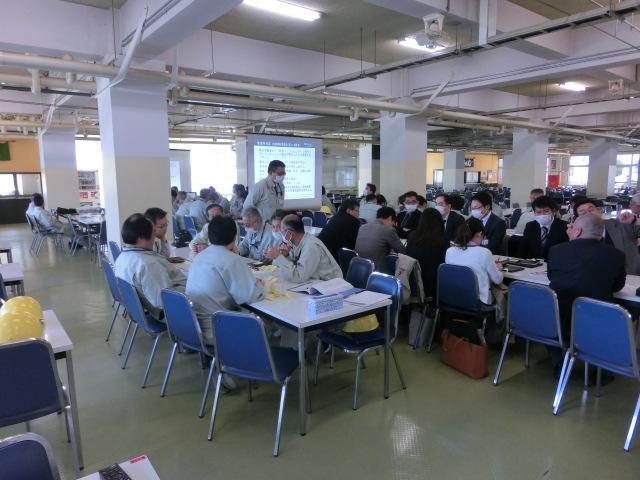1.Business Continuity Plan
The Shindengen Group’s Business Continuity Plan (BCP) ensures risks are managed appropriately at times of large-scale disaster. The BCP conforms to ISO 22301 (Business Continuity Management) and provides guidance in managing operational and supply chain risks, until such time as the business can restart operations as per normal.
The Business Continuity Management (BCM) Committee was established in FY2012, and is chaired by the President. This Committee has strengthened disaster response and business continuity measures under the “Disaster Prevention and Business Continuity Policy” and regularly distributes and collates risk management information from across the Group both domestically and overseas.
Annually, training and top management reviews are held to continuously improve the suitability, appropriateness, and effectiveness of the BCM system.
-
-

- Business Continuity Training
-
Emergency Response and Business Continuity Plan-Statement of Principles
The Shindengen Group Emergency Response and Business Continuity Plan is designed to promote a coordinated and effective response to a natural disaster or other unforeseen event in order to minimize the disruption to the operations of the Group as a whole.
- Objectives
(1)To ensure the safety of employees, customers and affiliated staff
(2)To fulfill our delivery obligations to customers and enable the resumption of normal business operations as soon as practicable
(3)To retain the confidence and respect of our customers and suppliers
(4)To work together with and make a meaningful contribution to both the local community and wider society, particularly with regards to preventing secondary disasters - The Emergency Response and Business Continuity Plan will be reviewed both regularly and on an as-needs basis to ensure ongoing relevance and efficacy.
- This Statement of Principles will be circulated widely both within and outside the Shindengen Group.
2.Responding to COVID-19
The Company-wide BCPs prescribe responses to infections disease scenarios, and Shindengen has taken the following measures in line with the BCPs in response to the COVID-19 pandemic to prevent the spread of the disease.
• Thoroughly practice basic disease prevention actions (take temperatures, wash hands, practice coughing etiquette, wear masks, avoid the Three Cs, etc.)
• Reduce infection risk (limit meeting participants; prohibit domestic business trips, seminars, and group meals; stagger cafeteria times; install partitions; etc.)
• Promote flex time and working from home (set up remote access environments, etc.)
• Uploading press releases on Shindengen’s website (disseminate information on infection outbreaks and subsequent responses, etc.)
• Unveiling a COVID-19 response portal on the internal intranet (raise awareness of COVID-19 response table and flow chart, etc.)
3.Information Security
Shindengen is committed to ensuring the security of all workplace information. An information security division is tasked with both protecting the Group’s information systems from external attack, and preventing external leaks from internal sources.
Information security education workshops are held annually for all employees.
Intrusion detection and prevention software helps to protect, identify and respond to any external threats that may potentially compromise Shindengen’s information systems. Additionally, the surveillance of employee internet activities and maintenance of computer operational logs through integrated monitoring software are designed to manage the risk of an information leak from an internal source.
4.Export Control and Security
To maintain international peace and security, the Shindengen Group complies with export laws, including the “Foreign Trade Control Law” and has established a strict export control system. The Shindengen Group strives to prevent the spread and accumulation of excessive weaponry, with particular regard to weapons of mass destruction or social harm.
At Shindengen, the “Security Trade Control Committee” is tasked with ensuring export transactions meet the high ethical standards imposed by “Security Trade Control Regulations.” Additionally, even in domestic sales, the end-users are investigated to determine whether or not the product is ultimately to be exported and if it has the potential to be used to cause social harm and/or endanger international peace.
5.Intellectual Property Protection
Intellectual Property Rights Policy
The Shindengen Group understands the importance of respecting and protecting intellectual property rights. Three principles guide our actions:
- Do not infringe upon the intellectual property rights of other companies;
- In an instance where another company’s patent is required, obtain agreement from that company prior to commercialization; and
- In an instance where a patent is infringed upon accidentally and subsequently identified, terminate such infringing activities within six months.
Invention Compensation
To encourage innovation, Shindengen guarantees the invention credit rights of employees.
Under the “Rules for Handling Inventions” we have established a compensation system that pays incentives for new invention or design as prescribed under the Patent Act, Utility Model Law, and Design Law. Compensation can include application fees, registration fees, licensing fees and any transfer of license fees. Additionally, compensation is not strictly limited to instances of registered inventions, but rather assessed on a case-by-case basis before the determination of compensation from the “internal awards regulation.”
Intellectual Property Rights Education
By increasing awareness through education about intellectual property rights, the Shindengen Group aims to encourage innovation, while maintaining compliance with the relevant legislation. Thorough research is conducted before any commercialization commences in order to prevent the infringement of intellectual property rights.
The Shindengen Group is also committed to protecting privileged information. Regular training is provided to employees to empower them with the knowledge as to what constitutes intellectual property rights and privileged information.
Regular brainstorming events to encourage inventions in the workplace are also held for each department.
Counterfeit Products – Zero-Tolerance
The Shindengen Group has a zero-tolerance policy for counterfeit products that infringe patents, models, designs and trademarks.
Participation in the Kawasaki Intellectual Property(IP)Exchange Program
In addition to stepping up initiatives to reduce IP-related risks, Shindengen is participating in the Kawasaki IP Exchange Program sponsored by the Innovation Promotion Office of Kawasaki City’s Economic and Labor Affairs Bureau and the Kawasaki Institute of Industrial Promotion. Through its participation in this program, Shindengen intends to offer open patents from its patent portfolio and thereby assist SMEs, venture startups and research organizations in their efforts to develop new products and businesses.
In the face of rapid technological advancement, a number of businesses are shifting their IP strategies from a “competition”-focused approach aimed at monopolizing IP rights to a “co-creation”-focused approach that promotes open innovation and facilitates collaborative business creation involving major companies, SMEs, startups and research organizations. Accordingly, Shindengen will contribute to this approach via the aforementioned program in line with its support of the United Nations’ Sustainable Development Goal No. 9, which aims to “promote inclusive and sustainable industrialization and foster innovation.”


